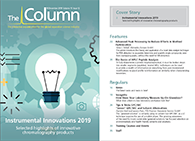The 2020 LCGC Awards Winners are...
LCGC is proud to announce that Daniel W. Armstrong and Szabolcs Fekete are the winners of the 13th annual LCGC Lifetime Achievement and Emerging Leader in Chromatography Awards, respectively.
LCGC is proud to announce that Daniel W. Armstrong and Szabolcs Fekete are the winners of the 13th annual LCGC Lifetime Achievement and Emerging Leader in Chromatography Awards, respectively. Armstrong and Fekete will be honoured in a symposium as part of the technical programme at the Pittcon 2020 conference in Chicago, USA, on 3 March 2020.
The Lifetime Achievement Award

The Lifetime Achievement in Chromatography Award honours an outstanding professional for a lifetime of contributions to the advancement of chromatographic techniques and applications. Armstrong, the 2020 winner, is the R.A. Welch Distinguished Professor of Chemistry and Biochemistry at the University of Texas at Arlington. He has worked on an extremely broad range of separation techniques including HPLC; GC; SFC; micellar liquid chromatography; thin-layer chromatography; countercurrent chromatography; CE; and FFF, among others. He developed the theory and mechanistic background behind many of the practical advances in these techniques. Further, he advanced the use of separations techniques as a means to obtain important physicoâchemical data. His most recent work in ultrafast separations and signal processing is driving fundamental changes in the field. Among Armstrong’s greatest contributions is his work in the field of enantiomeric separations. He published a seminal paper in Science in 1986 that described in detail the mechanism of chiral recognition by cyclodextrins in aqueous and hydro-organic solvents. This was also the first example of small-molecule molecular modelling. This study indicated the necessity of chromatographic enantiomeric separations for purity assessment and pharmacokinetic and pharmacodynamic studies, and provided impetus that led the U.S. Food and Drug Administration to issue new guidelines in 1992 for the development of stereoisomeric drugs. This changed the way that the pharmaceutical industry operated worldwide and these changes still reverberate today.
The Emerging Leader Award

The Emerging Leader in Chromatography Award recognizes the achievements and aspirations of a talented young separation scientist who has made strides early in his or her career towards the advancement of chromatographic techniques and applications. Fekete, the 2020 winner, earned his Ph.D. degree in 2011 from Technical University of Budapest, Hungary, and is currently a scientific collaborator at the University of Geneva, Switzerland. Fekete was the first to evaluate the impact of operating pressure on proteins retention and selectivity in reversed-phase LC, and has also published valuable work on the retention modelling of large proteins (monoclonal antibodies) using computer simulation, suggesting a generic method development approach and platform methods that are very important for pharmaceutical industrial laboratories. He has also carried out fundamental studies in which the effect of longitudinal temperature gradient on retention, caused by frictional heating, was experimentally dissociated from the combined effect of pressure and frictional heating. Through this work, the specific contributions of these effects to the overall retention were determined for both small and large solutes.
Visit the LCGC website or information about past LCGC award winners or for information on how to nominate a candidate for a future award.

Evaluating the Accuracy of Mass Spectrometry Spectral Databases
May 12th 2025Mass spectrometry (MS) can be effective in identifying unknown compounds, though this can be complicated if spectra is outside of known databases. Researchers aimed to test MS databases using electron–ionization (EI)–MS.

.png&w=3840&q=75)

.png&w=3840&q=75)



.png&w=3840&q=75)



.png&w=3840&q=75)












